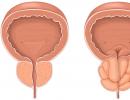How to lower the pulse? Methods for slowing the heart rate: drug therapy and recipes from the people

Each of us at least once, felt the rapid beating of his pulse. Some were “helped” to feel this illness, others by jogging or increased physical activity. A sharp increase in heart rate is caused by excessive activation of the heart, which is fraught with adverse consequences for the body and human life. Let's talk about what causes an increased heart rate and how to reduce the pulse with the help of medicine and folk methods.
Pulse and what causes it to accelerate?
The pulse is called the oscillation of the walls of the arteries, which occur when the heart ejects blood. The norms of the pulse depend on the age of the person and are:

In addition to age differences, one should take into account the individual characteristics of the body and the fitness of a person. After all, a person who is professionally involved in sports needs fewer heart contractions to pump the same amount of blood than an ordinary untrained body.
As for the pulse, its increase indicates that the heart muscles were sent to contract much faster. Why it happens? Two groups of factors affecting the increase in heart rate should be distinguished.
- External causes affecting the human pulse.
- The presence of a disease that "makes" the heart beat faster.
Let's consider each group in more detail.
External causes of high heart rate
In order to figure out how to reduce the pulse, you should find out the cause of its occurrence, and what factors influenced its acceleration. Both in a healthy person and in a person suffering from pathologies associated with the heart and blood vessels, the pulse rate can increase for such external reasons:
- stress or emotional overstrain;
- increased fatigue (not rash, excessive physical activity);
- bad habits, alcohol abuse and smoking;
- taking or overdose of medications;
- overweight, obesity, eating large amounts of fatty foods.
It should also be noted as the cause of the increase in the pulse of pregnancy. Although it is not an external factor, it cannot be called a disease either. For such a condition, the frequency of beats per minute above the norm is the norm, since there is more blood in the body and the heart has to work more actively.
What diseases can cause an increase in heart rate?
Patients quite often go to the hospital, complaining of an increase in the rhythm of the pulse. But I want to immediately note that this symptom is classified according to height (the degree with which the walls of the arteries fluctuate) and frequency (the number of contractile movements of the heart). If such visits to the doctor are regular, then you should check for serious abnormalities or possible pathologies. Such symptoms are typical for the following diseases:
- tachycardia - a disease associated with an increase in the frequency of contractions of the heart muscle;
- vascular atherosclerosis - the presence of atheromatous plaques in the main arteries;
- ischemia - complete or partial narrowing of the lumen of blood vessels;
- hypertension (hypertension) - a chronic increase in blood pressure;
- diseases characterized by a malfunction of the heart valves - heart failure, arrhythmia, angina pectoris, etc.

? Therapy Methods
Increased pulsation is a deviation, therefore, it is necessary to reduce the pulse by any means, so as not to provoke complications of a different nature. Depending on the cause that provoked the pathology, there are three main methods for reducing the pulse:
- Medical.
- Through traditional medicine.
- Mechanical at home.
medical method?
Surely everyone at least once resorted to the use of pharmacy sedatives. For some, this way of calming down is the norm. But it is not worth making a diagnosis on your own, because in addition to calming down, it is necessary to reduce the level (frequency) of the heartbeat. In order to choose the right medicines, you need to contact a specialist who, after certain tests and cardio checks, will prescribe a suitable remedy that affects the heart rate.
- validol tablets;
- tablets or tincture of valerian;
- Valocordin tablets;
- motherwort tincture.
These funds cannot be called curative, they are used at a high rhythm to relieve symptoms (normalize contractions). The drugs begin to act in 15-25 minutes, so you should not wait for every second of calm, immediately after taking it. If the desired effect does not occur, after half an hour it is necessary to repeat the intake of sedatives. Repeated intake should not be abused, otherwise the contractions may fall below the required level, and this threatens the development of bradycardia, and it will be necessary to increase the pulse.
through traditional medicine?
Since ancient times, our ancestors, who did not know about the “miracle effect” of a magic pill, in order to lower their pulse, turned to folk methods. Products that have a positive effect on the oscillation of the walls of the main arteries include:
- Black currant - its main properties include a decrease in heart rate.
- Honey - lowers blood pressure, respectively, and heart rate.
- Rosehip - decoctions are prepared from these berries, which strengthen the heart muscles, which allows them to expel blood with normal force. In other words, the frequency of contractions of this muscle is significantly reduced.
- Herbal decoctions:

Traditional medicine methods are quite effective, but require constant use to obtain the expected result. They are actively used by people who have an established diagnosis of tachycardia. For preventive purposes, such methods are also suitable.
mechanically?
In addition to drugs and products for oral administration, there are mechanical (external) influences that help to reduce the pulse. How to do it?
- Inhale deeply enough, holding your mouth and nose, try to forcefully exhale the air. So, pressure will be created in the cavities of the mouth and nose, which will contribute to the excitation (activity) of the vagus nerve and reduce contractions of the heart muscle.
- Press the eyeballs with your fingers (close your eyes). The pressure should be gentle. The effect should be up to 30 seconds. Repeat these steps several times.
- Lie face down on a flat surface. Stay in this position for 30 minutes.
- Massage (massage) the cervical region in the area of the main arteries.
depending on the person's blood pressure?
If a person has a normal pressure, but there is a strong pulsation, then most likely it is caused by external factors, which we wrote about above. When they are eliminated, the pulse should return to normal. In cases where concomitant symptoms join in the form of pain in the heart or head, dizziness, semi-consciousness, then the following actions should be taken:
- take a horizontal position;
- breathe deeply and evenly, women saturate the blood with oxygen;
- open a window for more oxygen penetration;
- put a wet, cold towel on your forehead.
Relapses and pathologies associated with the heart or blood vessels may indicate an incorrect lifestyle. How to lower the pulse in this "situation"? The answer is very simple - reconsider the way you live. Give up bad habits, play sports (at least walk 3-5 times a week), eat right (balanced).
How to lower the pulse if the pressure in the arteries is lowered?
If a person suffers from hypotension and he has an increase in heart rate with the manifestation of symptoms such as:
- throbbing pain in the head;
- bouts of nausea;
- feeling of anxiety;
- fear for your life.
Then tincture of valerian and motherwort will help to reduce it. To resort to such therapy, in cases of persistent relapses, you should consult your doctor.
For preventive purposes, you can use products "prescribed" by traditional medicine (currant, honey, rosehip broth). As for medicines, validol and valocordin can reduce the pulse with hypotension.
How to lower the pulse if the pressure is increased?
Patients who are diagnosed with a chronic increase in pressure are called hypertensive patients, and an increase in heart rate is one of the main symptoms of hypertension. Often, people with this diagnosis take certain drugs prescribed by their doctor. When a symptom appears, an increase in the rhythm of the fluctuation of the walls of the arteries, the pressure should initially be normalized with the help of medications taken by the hypertensive patient. As the pressure drops, the pulse will return to normal. If the pressure does not drop, then it is better to call an ambulance.

- No bad habits. Sometimes it is quite enough to give up alcohol and cigarettes in order to bring the work of the heart back to normal, since vasoconstriction no longer occurs (a characteristic symptom when drinking alcohol or smoking cigarettes).
- Physical exercise. Physical education contributes to the training of the heart muscles, so a daily load in the form of 20 minutes of exercise will benefit the body.
- Forget about strong coffee and teas. These drinks excite the heart muscles quite strongly, so they should be discarded. Replace them with a decoction of wild rose or medicinal herbs.
- Minimize your salt intake. It is salt that retains fluid in the body, which leads to an increase in the load on the heart.
- Normalize your diet and daily routine. Give your body more rest. Daily sleep should be at least 8 hours.
- If you are overweight, normalize it. This will facilitate the work of the heart muscles, relieve the increased load from the heart.
- In order not to wonder how to lower your heart rate, try not to take everything “close to your heart” both literally and figuratively. Try to reduce emotional upheavals, scandalous situations. Avoid conflict situations and stress.
 |
In contact with






